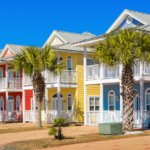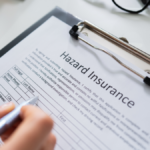The home-buying process requires many considerations and steps, from starting your search to finally closing escrow and getting the keys. Anyone who buys a home needs to familiarize themselves with homeowners insurance. After investing so much time and money into purchasing an asset as large as a home, you want to be sure that it’s protected from the unexpected. Homeowners’ insurance isn’t a luxury: it’s a necessity.
Types of Homeowners Insurance
Homeowners’ insurance provides financial protection from various losses. There are eight types of homeowners insurance with different coverage levels.
HO-1: Basic Form
An HO-1 policy is the most basic policy available in the market. It’s very limited in its coverage, as it only covers the structure of your home, attached structures, and appliances at their actual cash value. It doesn’t cover liability and personal property or living expenses you might incur if your home needs extensive repairs. It’s a highly unpopular choice for homeowners due to its limitation.
An HO-1 policy is a named perils policy, which means that it only provides coverage in specific situations, which typically include:
- Explosions
- Fire and lightning
- Damage from aircraft or cars
- Vandalism
- Theft
- Smoke
- Riots
- Hail and windstorms
- Falling objects
- Vandalism
HO-2: Broad Form
HO-2 policies are a significant upgrade from HO-1 policies as coverage protects your home and expands to include your personal belongings and liability in some circumstances. Like an HO-1 policy, this is also a named perils policy. In addition to all named perils in an HO-1 policy, it also covers:
- Weight from snow, ice, or sleet
- Sudden and accidental tearing apart, burning, or cracking from a built-in appliance like a water heater or an HVAC system
- Volcanic eruption
- Freezing
- Sudden and accidental damage from artificial electric currents, like power surges
- Accidental overflow or discharge of water or steam
HO-3: Special Form
An HO-3 policy is the most popular home insurance in the United States. As an all-risks coverage, it covers your home and personal property for all the named perils in HO-1 and HO-2 policies and other situations. As a default, HO-3 policies typically cover your home at its replacement cost and personal property at actual cash value.
Common exclusions include:
- Floods
- Earth movements
- Certain dog breeds
- Damage from neglect
- Pest infestations
- Mold
- Power surges or outages
- Nuclear hazards
- Government actions
- Home-based business operations
- Ordinance or law exclusion
HO-4: Contents Broad Form
HO-4 coverage is commonly referred to as renters insurance. It is specifically designed for people who rent a home or an apartment. It covers your belongings both inside your rental property and anywhere around the world. HO-4 policies cover the same-named perils as HO-2 and HO-3 policies.
Renters insurance also covers liability and additional living expenses if the place you rent is damaged and you need to live elsewhere while it’s undergoing repairs. It usually covers your personal belongings at their replacement cost.
HO-5: Comprehensive Form
This is the most robust, holistic type of single-family home protection available. It covers your home, liability, personal belongings, additional living expenses, and medical payments for others. Limits for categories of personal belongings like jewelry are also higher. Like an HO-3 policy, it’s an all-risks coverage.
Key differences between an HO-3 policy and an HO-5 policy include the following:
- With HO-5, dwelling and personal property are insured at replacement value cost by default. HO-3 policies insure your personal property at actual cash value.
- An HO-5 policy provides all-risks coverage for your home and personal property. HO-3 policy has named-peril coverage for personal property
- HO-5 policies have much higher limits for expensive personal items, while HO-3 policies have limited coverage for costly personal property.
HO-6: Unit-owners Form
HO-6 coverage is also called condo insurance for people who live in condos or co-ops. The amount of coverage you’ll need will vary based on what’s covered by your HOA’s insurance. The HOA will usually have its own insurance policy protecting external parts of the building and common areas.
This is a named peril policy that typically covers the following:
- Explosions
- Fire and lightning
- Sudden and accidental damage from artificial electric currents
- Weight from snow, ice, or sleet
- Pipes freezing
- Water damage from plumbing or HVAC overflow
- Water heater damage
- Volcanic eruptions
- Damage from aircraft or cars
- Falling objects
- Vandalism
- Theft
- Smoke
- Riots
- Hail and windstorms
- Falling objects
- Vandalism
HO-7: Mobile Home Form
This policy is for mobile or manufactured homes such as sectional homes, RVs, modular homes, and trailers. HO-7 covers personal belongings, liability, medical payments, and additional living expenses. The exterior of your home is covered under an all-risks policy, while personal belongings are covered under a named perils policy.
HO-8: Modified Coverage Form
We’ve made it to the last type of homeowners insurance. An HO-8 policy is what you’d get if you have an older home or a home that would be difficult to replace. This usually includes architecturally unique homes, historically designated homes, and homes built with no longer common materials. HO-8 policies might be a fit if it would cost more to repair your damaged home than its current value.
HO-8 policies include coverage for personal property, liability, dwelling, additional living expenses, and medical payments. A named perils policy will help cover your home’s structure and personal belongings.
Review Your Policy
It’s important to remember what might not be covered on your policy so that you can buy separate coverage to be adequately protected from risks you may face. You also need to regularly assess your belongings and property to ensure that you have the proper limits on your policy and aren’t underinsured.
Our team can help you understand the different types of homeowners insurance and what you should get based on your circumstances. Contact the Guided Solutions team to learn more or request a quote today.










